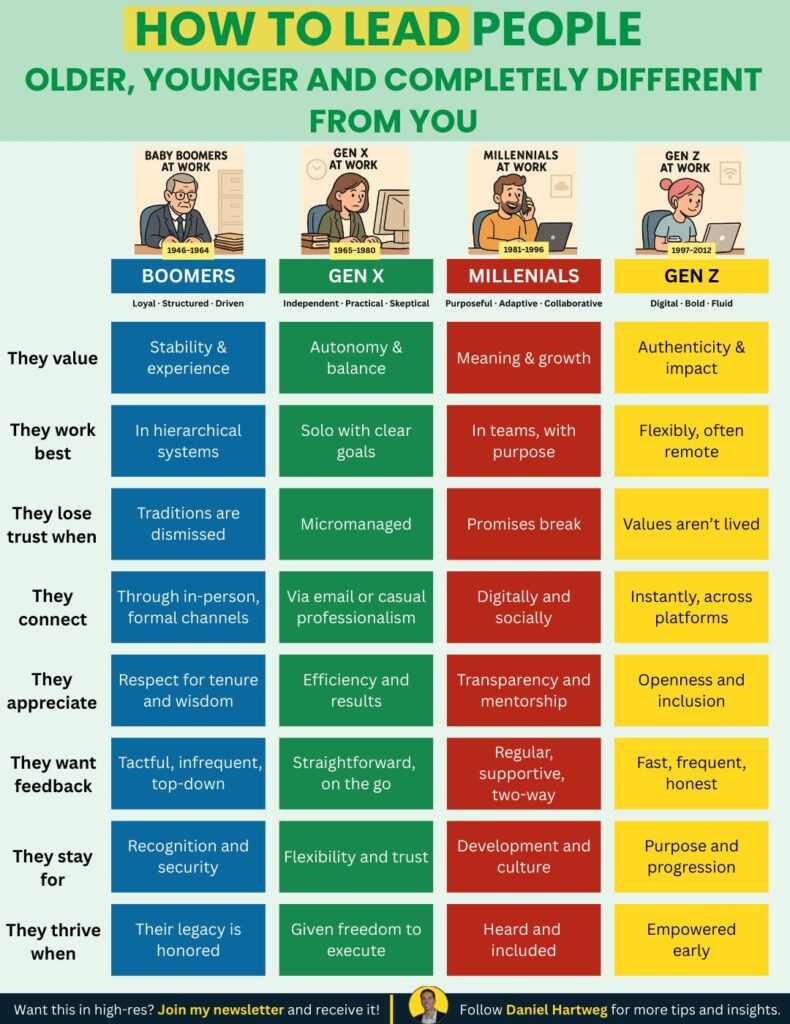
Based on the generational characteristics outlined in the attached image, here is an elaboration on the typical character of male and female engineers for each generation.
It is crucial to note that these are broad generalizations based on generational trends. Individual personality, company culture, and personal experiences will always be the primary factors in shaping a person’s character.
Baby Boomer Engineers (Born 1946-1964)
Core Character Traits (Both Genders): Loyal, structured, driven, and experienced. They value stability and have a deep respect for hierarchical systems and proven engineering principles. They are the repositories of institutional knowledge.
Male Boomer Engineer: Often seen as the seasoned veteran or principal engineer. He likely worked his way up through a structured career path and values formal titles and recognition. He may prefer in-person meetings and formal design reviews. His leadership style is often command-and-control, expecting younger engineers to learn through observation and respect his hard-earned wisdom.
Female Boomer Engineer: A trailblazer who often had to work significantly harder to prove herself in a male-dominated field. She is highly resilient, detail-oriented, and values the security she has built. She may be a meticulous project manager who insists on following established procedures and documentation to the letter. She appreciates respect for her tenure and contributions.
How They Work: They prefer clear, solo assignments with defined goals. They lose trust if company traditions or quality standards are dismissed for speed. They connect and give feedback through formal, in-person channels.
Gen X Engineers (Born 1965-1980)
Core Character Traits (Both Genders): Independent, pragmatic, efficient, and results-oriented. They value work-life balance and autonomy above rigid structure. They are the ultimate problem-solvers who just want to be given a goal and the freedom to execute.
Male Gen X Engineer: The skeptical and competent individual contributor. He is not overly impressed by titles and prefers to be judged on his results. He dislikes micromanagement and thrives with a hands-off manager. He communicates directly and efficiently, preferring email over meetings. He is focused on building a stable but balanced life.
Female Gen X Engineer: Highly adaptable and self-reliant. She mastered the shift from analog to digital engineering tools. She values efficiency and often finds ways to streamline processes. She appreciates flexibility (like remote work) long before it became commonplace. She provides straightforward feedback and expects the same.
How They Work: They work best autonomously. They lose trust immediately if micromanaged. They connect via email and appreciate a casual, professional demeanor focused on efficiency.
Millennial (Gen Y) Engineers (Born 1981-1996)
Core Character Traits (Both Genders): Purposeful, adaptive, collaborative, and development-focused. They seek meaning in their work and want to understand the “why” behind a project. They value teamwork, mentorship, and a positive culture.
Male Millennial Engineer: The collaborative team player. He thrives in agile environments, enjoys whiteboarding sessions, and seeks constant learning. He values transparency from leadership and regular, supportive feedback from his manager. He is motivated by projects that have a positive social or environmental impact.
Female Millennial Engineer: Often a bridge between older generations and Gen Z. She is highly adaptive, values inclusivity, and seeks mentorship opportunities both as a mentee and a mentor. She appreciates companies that live their stated values regarding diversity and sustainability. She wants her voice to be heard in team settings.
How They Work: They work best in collaborative teams with a clear purpose. They lose trust if company promises (e.g., about culture, ethics, or development) are broken. They connect digitally and socially, and want frequent, two-way feedback.
Gen Z Engineers (Born 1997-2012)
Core Character Traits (Both Genders): Digital-native, bold, fluid, and authentic. They are entrepreneurs at heart who value authenticity, radical openness, and immediate impact. They are comfortable with change and remote work.
Male Gen Z Engineer: The digital innovator. He is completely fluid with technology (e.g., coding, simulations, AI tools) and prefers to communicate instantly via platforms like Slack. He is bold in challenging outdated methods and expects fast, honest feedback. He is motivated by rapid skill progression and the freedom to work flexibly.
Female Gen Z Engineer: Values authenticity and inclusion above all. She is bold in advocating for herself and others, and expects the company’s diversity and inclusion values to be lived, not just stated on a website. She is highly entrepreneurial, may have a side-hustle, and seeks empowerment and meaningful responsibility early in her career.
How They Work: They work best flexibly, often remotely. They lose trust if company values aren’t lived out authentically. They connect instantly across multiple digital platforms and expect fast, frequent, and honest communication.
Conclusion for Leaders
The character of an engineer is less defined by gender and more by the formative experiences of their generation.
To lead a Boomer, honor their legacy and experience.
To lead Gen X, give them autonomy and focus on results.
To lead a Millennial, provide purpose, collaboration, and growth.
To lead Gen Z, offer authenticity, flexibility, and a direct voice.
The most effective engineering teams leverage these diverse strengths, creating an environment where a Boomer’s experience, Gen X’s pragmatism, a Millennial’s collaboration, and Gen Z’s innovation can all thrive together.
